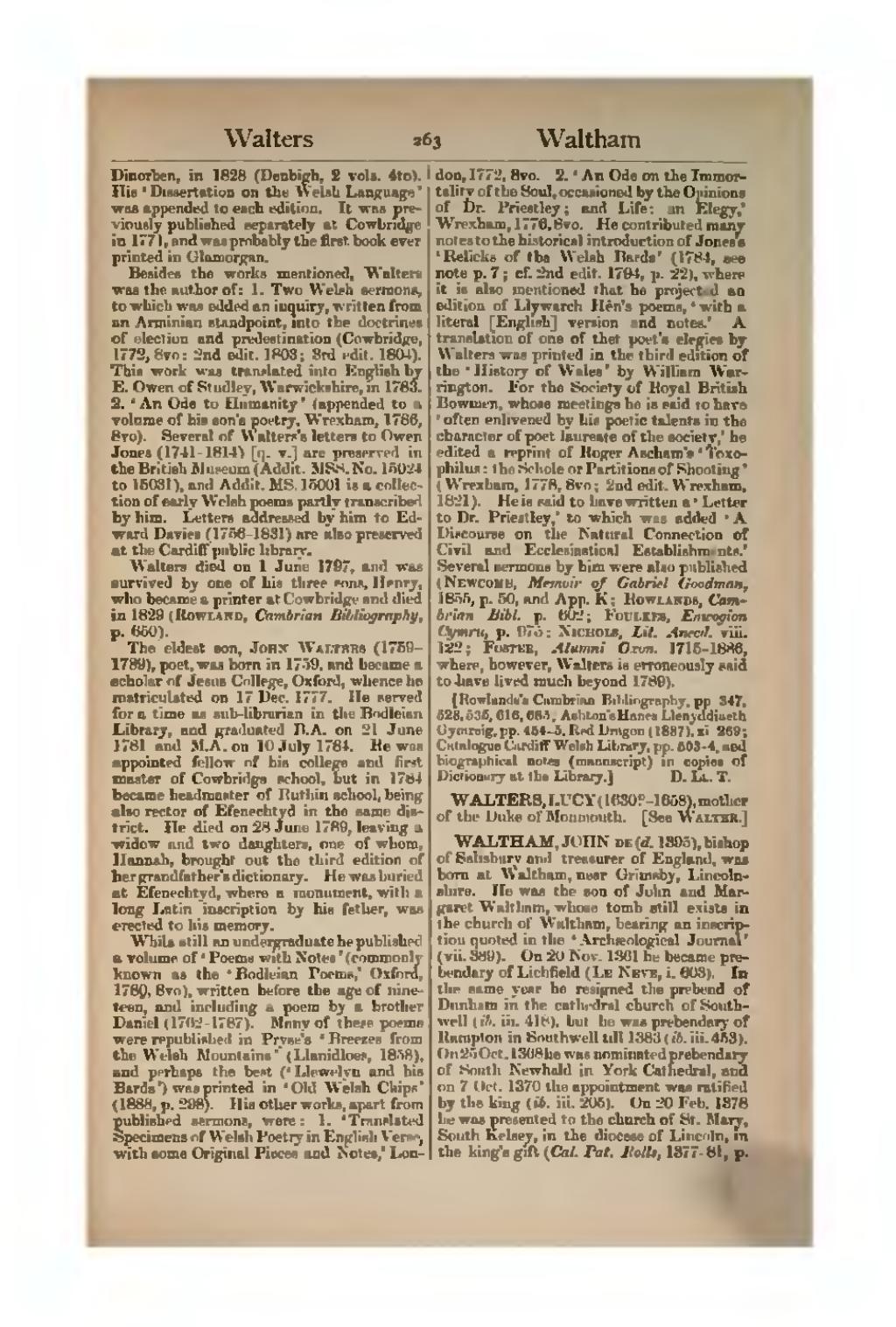Dinorben, in 1828 (Denbigh, 2 vols. 4to). His ‘Dissertation on the Welsh Language’ was appended to each edition. It was previously published separately at Cowbridge in 1771, and was probably the first book ever printed in Glamorgan.
Besides the works mentioned, Walters was the author of: 1. Two Welsh sermons, to which was added an inquiry, written from an Arminian standpoint, into the doctrines of election and predestination (Cowbridge, 1772, 8vo; 2nd edit. 1803; 3rd edit. 1804). This work was translated into English by E. Owen of Studley, Warwickshire, in 1783. 2. ‘An Ode to Humanity’ (appended to a volume of his son's poetry, Wrexham, 1786, 8vo). Several of Walters's letters to Owen Jones (1741–1814) [q. v.] are preserved in the British Museum (Addit. MSS. No. 15024 to 15031), and Addit. MS. 15001 is a collection of early Welsh poems partly transcribed by him. Letters addressed by him to Edward Davies (1756–1831) are also preserved at the Cardiff public library.
Walters died on 1 June 1797, and was survived by one of his three sons, Henry, who became a printer at Cowbridge and died in 1829 (Rowland, Cambrian Bibliography, p. 650).
The eldest son, John Walters (1759–1789), poet, was born in 1759, and became a scholar of Jesus College, Oxford, whence he matriculated on 17 Dec. 1777. He served for a time as sub-librarian in the Bodleian Library, and graduated B.A. on 21 June 1781 and M.A. on 10 July 1784. He was appointed fellow of his college and first master of Cowbridge school, but in 1784 became headmaster of Ruthin school, being also rector of Efenechtyd in the same district. He died on 28 June 1789, leaving a widow and two daughters, one of whom, Hannah, brought out the third edition of her grandfather's dictionary. He was buried at Efenechtyd, where a monument, with a long Latin inscription by his father, was erected to his memory.
While still an undergraduate he published a volume of ‘Poems with Notes’ (commonly known as the ‘Bodleian Poems,’ Oxford, 1780, 8vo), written before the age of nineteen, and including a poem by a brother Daniel (1762–1787). Many of these poems were republished in Pryse's ‘Breezes from the Welsh Mountains’ (Llanidloes, 1858), and perhaps the best (‘Llewelyn and his Bards’) was printed in ‘Old Welsh Chips’ (1888, p. 298). His other works, apart from published sermons, were: 1. ‘Translated Specimens of Welsh Poetry in English Verse, with some Original Pieces and Notes,’ London, 1772, 8vo. 2. ‘An Ode on the Immortality of the Soul, occasioned by the Opinions of Dr. Priestley; and Life: an Elegy,’ Wrexham, 1776, 8vo. He contributed many notes to the historical introduction of Jones's ‘Relicks of the Welsh Bards’ (1784, see note p. 7; cf. 2nd edit. 1794, p. 22), where it is also mentioned that he projected an edition of Llywarch Hên's poems, ‘with a literal [English] version and notes.’ A translation of one of that poet's elegies by Walters was printed in the third edition of the ‘History of Wales’ by William Warrington. For the Society of Royal British Bowmen, whose meetings he is said to have ‘often enlivened by his poetic talents in the character of poet laureate of the society,’ he edited a reprint of Roger Ascham's ‘Toxophilus: the Schole or Partitions of Shooting’ (Wrexham, 1778, 8vo; 2nd edit. Wrexham, 1821). He is said to have written a ‘Letter to Dr. Priestley,’ to which was added ‘A Discourse on the Natural Connection of Civil and Ecclesiastical Establishments.’ Several sermons by him were also published (Newcome, Memoir of Gabriel Goodman, 1855, p. 50, and App. K; Rowlands, Cambrian Bibl. p. 602; Foulkes, Enwogion Cymru, p. 975; Nichols, Lit. Anecd. viii. 122; Foster, Alumni Oxon. 1715–1886, where, however, Walters is erroneously said to have lived much beyond 1789).
[Rowlands's Cambrian Bibliography, pp. 347, 528, 535, 616, 685; Ashton's Hanes Llenyddiaeth Gymreig, pp. 454–5; Red Dragon (1887), xi. 269; Catalogue Cardiff Welsh Library, pp. 503–4, and biographical notes (manuscript) in copies of Dictionary at the Library.]
WALTERS, LUCY (1630?–1658), mother of the Duke of Monmouth. [See Walter.]
WALTHAM, JOHN de (d. 1395), bishop of Salisbury and treasurer of England, was born at Waltham, near Grimsby, Lincolnshire. He was the son of John and Margaret Waltham, whose tomb still exists in the church of Waltham, bearing an inscription quoted in the ‘Archæological Journal’ (vii. 389). On 20 Nov. 1361 he became prebendary of Lichfield (Le Neve, i. 603). In the same year he resigned the prebend of Dunham in the cathedral church of Southwell (ib. iii. 418), but he was prebendary of Rampton in Southwell till 1383 (ib. iii. 453). On 25 Oct. 1368 he was nominated prebendary of South Newbald in York Cathedral, and on 7 Oct. 1370 the appointment was ratified by the king (ib. iii. 205). On 20 Feb. 1378 he was presented to the church of St. Mary, South Kelsey, in the diocese of Lincoln, in the king's gift (Cal. Pat. Rolls, 1377–81, p.
